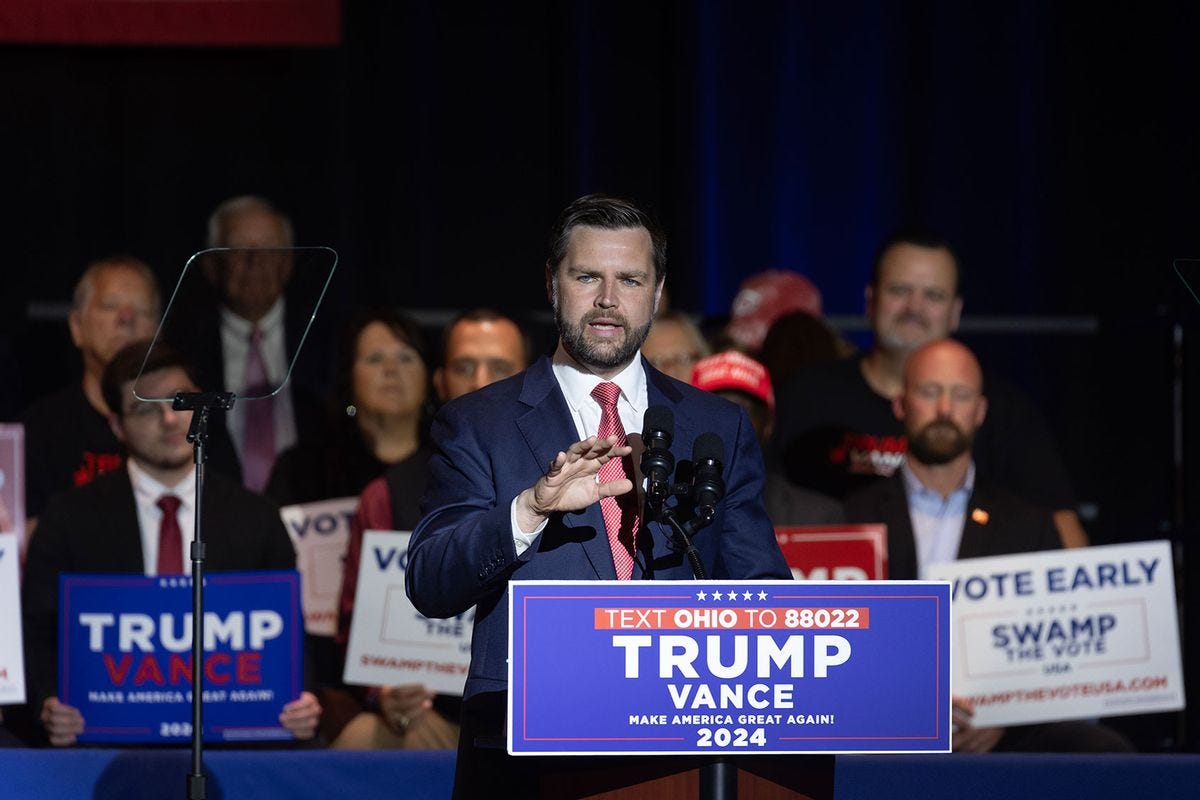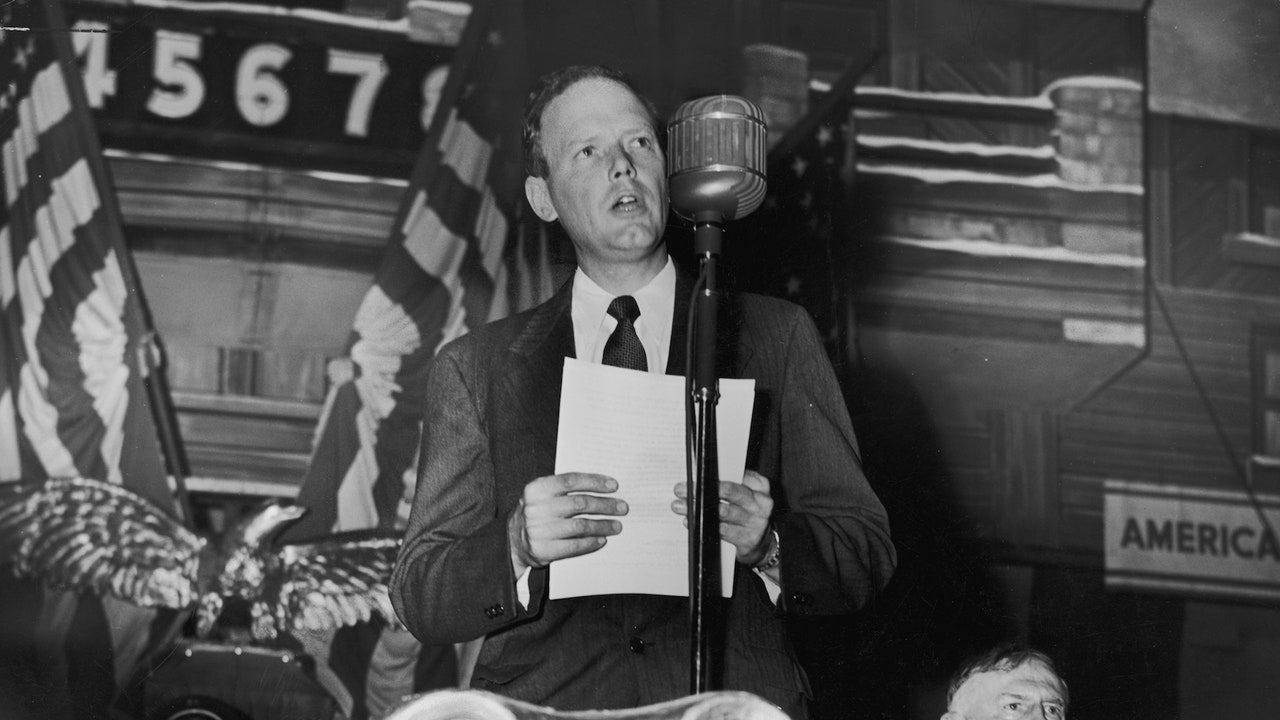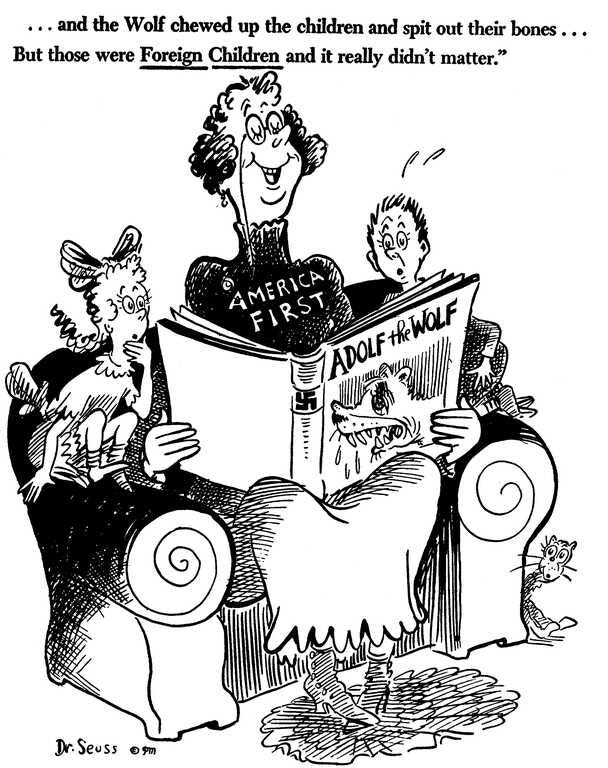The Myth of "Anti-War" Republicans
From Charles Lindbergh to J.D. Vance, the GOP has a history of claiming racial imperialism is "anti-war populism."
You can support my work by liking (click the ❤️), subscribing, and telling a friend about JoeWrote. Thank you! — Joe
“We have weakened ourselves for many months, and still worse; we have divided our own people by this dabbling in Europe’s wars. While we should have been concentrating on American defense, we have been forced to argue over foreign quarrels.”
This quote would have fit right at home in the 2024 Republican National Convention. It would have complemented Marjorie Taylor Greene’s comment that Joe Biden is “securing Ukraine’s borders instead of America’s,” or any of the other conservative condemnations of America’s participation in the European War. While it is not a uniform GOP position, the anti-Ukraine sentiment is a reflection of the Republican base. Polling shows three times as many Republicans think the U.S. is sending “too much” aid to Ukraine compared to Democrats. Given this, the above quote would have brought the house down at the RNC, or any other Trump rally.
But that quote didn’t come from Donald Trump, J.D. Vance, Marjorie Taylor Greene, or any other modern Republican. It’s not even from this century. That quote is from April 23, 1941. It was orated by Charles Lindbergh in a speech sharing the title of the Republican agenda: “America First.”
America First
After becoming the first aviator to fly nonstop across the Atlantic, Charles Lindbergh became a prominent spokesperson for the America First Committee (AFC). Sympathetic to the Nazis, the America First Committee rallied to keep America out of World War II. Much like modern Republicans, they positioned themselves as the voice of working-class Americans. From Lindbergh’s speech:
“That is why the America First Committee has been formed–to give voice to the people who have no newspaper, or newsreel, or radio station at their command; to the people who must do the paying, and the fighting, and the dying if this country enters the war.”
However, just like the contemporary Republicans who echo his oratory tactics, Charles Lindbergh was neither anti-war nor anti-imperialist. He was only against one particular war: the one in which white men fought each other.
A vocal anti-semite, Lindbergh wrote fondly of Hitler and the Nazis. He blamed America’s overwhelming support for the Allies on Jewish media manipulations, much like Marjorie Taylor Greene blames “globalists” (that means Jews) for getting us involved in Ukraine. Lindbergh described the European war as “a war within our own family of nations, a war which will reduce the strength and the treasures of the White race.” He pleaded with his audience to “let us not commit racial suicide by internal conflict.”
Neither Lindbergh nor the America First Committee sought to reduce America’s imperial footprint. Instead, they thought it should be directed toward controlling non-White nations, particularly in Asia. One of Lindbergh’s greatest fears was that World War II would destroy Germany, which he believed was necessary to “dam the Asiatic hordes” from conquering Europe. He advocated for increased military spending, especially in aviation, which he believed was a testament to the supremacy of the White race. (This was immediately disproven by the Japanese attack on Pearl Harbor, but that’s another point.)
“[Aviation is] one of those priceless possessions which permit the White race to live in a pressing sea of Yellow, Black, and Brown.” - Charles Lindbergh
While Lindbergh and the America First Committee carried the banner of a populist anti-war movement, the reality is they were anything but. They supported American imperialism, but thought it should strive for White, Christian supremacy, not FDR’s anti-fascism. This strain of targeted empire quickly disappeared after Pearl Harbor, then took a back seat to anti-communist interventionism during the Cold War. Unfortunately, now that America’s political class is once-again divided on who its geopolitical foes are, the push for racial imperialism has resurfaced in the modern Grand Old Party, once again masquerading as a populist push for peace.
Make America First Again
Donald Trump had two reasons to pick J.D. Vance to join him on the Republican Presidential ticket:
1. Vance is backed by a boatload of fascist tech bro cash, and
2. He embodies Republicans’ “populist” rebranding attempt.
Along with platitudes to “support the working class” (they won’t), this new tint of Republicanism claims to be anti-war. Vance has opposed funding the Ukraine-Russia War since before it began, and a majority of House Republicans voted against the most recent arms transfer. As the Democrats support arming Ukraine, this divide has led many to label the Republican Party as “anti-war,” or at least a departure from the militarism of War ON Terror-era neoconservatives.
Do not be fooled. Modern Republicans are no more “anti-war” than Charles Lindbergh was. They opposed arming the Ukrainian military not because they believe American imperialism is wrong, but because it is being misdirected. Instead, they advocate for America’s military might to be directed elsewhere, usually at non-White nations. The nature of Republicans faux-populism was highlighted in a 2023 interview of Marjorie Taylor Greene, the most vocal anti-Ukraine figure in the GOP. When asked about potentially cutting America’s gargantuan military spending, MTG stated she had no interest in reducing the Pentagon’s budget, only preventing it from going to Ukraine.
Much like Lindbergh, Greene doesn’t want to end wars or spend military funding on social programs. She just thinks America is fighting the wrong enemy.
The aura of non-interventionism has even been afforded to Donald Trump, a man who yearns for explosions like a teenager counting the days until the release of the next Call of Duty. During his rambling RNC speech, Trump stated he would have kept the U.S. in Afghanistan because it would have helped the U.S. launch strikes against China.
Just like the long tradition of right wing opposition to European wars, Trump and the modern Republican Party are not “anti-war.” They are against this particular war, because they believe American imperialism would be better focused on non-White nations; specifically, China. Part of this anti-Sinoism comes from White supremacy, and part of it is anti-communism. Regardless of the source, the Republican conclusion is the same — stop wasting money fighting White men and start spending it on dominating Asians.
As they do on labor, Republicans are adopting the language of pseudo-populism to give themselves the veneer of being the anti-war candidates. In both cases, an inspection of their policy preferences shows they are masquerading as populists to court votes while offering the same hawkish policies Americans have endured since the end of World War II.
Past and present, conservatives have desired not only American hegemony, but White-supremacist control over other cultures they believe to be inferior. After a quarter-century of unwinnable wars in Persia and the Middle East, the American people have decided they want to wash their hands of the forever wars. So, Republicans are trotting out their “blue collar billionaires” and a fake hillbilly to try and trick Americans with a different tune to the same old song.
Thanks for reading! Make sure you subscribe so future articles are delivered straight to your inbox. Best! — Joe







Great piece. I completely agree and will save and bookmark this post.
A few additional points:
1. The idea that Trump and the Republicans are anti-war only works if you ignore what Trump actually did while he was president
https://caitlinjohnstone.com/2019/08/09/the-persistent-myth-that-trump-opposes-war/
https://caitlinjohnstone.com/2019/11/18/25-times-trump-has-been-dangerously-hawkish-on-russia/
https://www.thenation.com/article/world/opcw-leaks-syria/
https://jacobin.com/2023/06/donald-trump-tucker-carlson-antiwar-foreign-policy
2. "RW Populist" Republicans have been pretty open about the fact that they are only against the proxy war in Ukraine because they want to reallocate resources to militarily oppose China. Tucker Carlson, Saagar Enjeti, Steven Bannon, Matt Gaetz, Marjorie Taylor Green and others have all said this. Vivek Ramaswamy even said he wanted to end the proxy war in Ukraine to drive a wedge between Russia and China
3. Another reason for Republican opposition to Ukraine is also simple partisanship (the war was started by a Democrat). Republicans also opposed the NATO bombing of Yugoslavia, the intervention in Libya and the dirty war in Syria. Does anybody actually think they opposed any of those wars for any reason other than simple partisanship? Or that if Trump had launched the war in Ukraine, the Republicans wouldn't have lined up against it?
4. Christopher Hitchens of all people made a very similar point about Pat Buchanan back in 1999
https://www.salon.com/1999/10/16/buchanan_5/
Just so the "Trump didn't start any wars" MAGA "commies" know.. but, honestly, I think they do.